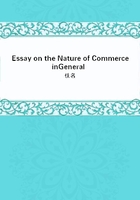
第62章
If 100 individuals or landowners deposit with a banker their income every six months as it is received, and then demand their money back as and when they have need to spend it, the banker will be in a position to lend much more of the money which he owes and receives at the beginning of the half years, for a short term of some months, than he will be towards the end of these periods. And his experience of the conduct of his clients will teach him that he can hardly lend during the whole year more than about one half of the sums which he owes. Bankers of this kind will be ruined in credit if they fail for one instant to pay their notes on their first presentation, and when they are short of cash in hand they will give anything to have money at once, that is to say a much higher interest than they receive on the sums they have lent. Hence they make it a rule based on their experience to keep always in hand enough to meet demands, and rather more than less. Many Bankers of this kind (and they are the greatest number) always keep in hand half the amount deposited with them and lend the other half at interest and put it into circulation. In this second example the Banker causes his notes of 100,000 ounces or ecus to circulate with 50,000 ecus, If he has a great flow of deposits and great credit this increases confidence in his notes, and makes people less eager to cash them, but only delays, his payments a few days or weeks when the notes fall into the hands of persons who are not accustomed to deal with him, and he ought always to guide himself by those who are accustomed to entrust their money to him. If his notes come into the hands of those of his own business they will have nothing more pressing than to withdraw the money from him.
If those who deposit money with the Banker are Undertakers and Merchants who pay in large sums daily and soon after draw them out it will often happen that if the Banker divert more than one third of his cash he will find himself in difficulty to meet the demands.
It is easy to understand by these examples that the sums of money which a Goldsmith or a Banker can lend at interest or divert from his cash are naturally proportionable to the practice and conduct of his clients; that while we have seen Bankers who were safe with a cash reserve of one-tenth, others can hardly keep less than one half or two-thirds, though their credit be as high as that of the first.
Some trust one Banker, some another. The most fortunate is the Banker who has for clients rich gentlemen who are always looking out for safe employment for their money without wishing to invest it at interest while they wait.
A general national bank has this advantage over the bank of a single Goldsmith that there is always more confidence in it. The largest deposits are willingly brought to it, even from the most remote quarters of the city, and it leaves generally to small Bankers only the deposit of petty sums in their neighbourhood.
Even the revenues of the State are paid in to it in countries where the Prince is not absolute. And this, far from injuring credit and confidence in it, serves only to increase them.
If payments in a national bank are made by transfers or clearings there will be this advantage, that they are not subject to forgeries, but if the Bank gives notes false notes may be made and cause disorder. There will be also this disadvantage that those who are in the quarters of the city at a distance from the Bank will rather pay and receive in money than go thither, especially those in the country. But if the bank notes are dispersed they can be used far and near. In the national Banks of Venice and Amsterdam payment is made only in book credit, but in that of London it is made in credit, in notes, and in money at the choice of the individuals, and it is today the strongest Bank.
It will then be understood that all the advantage of Banks, public or private in a city, is to accelerate the circulation of money and to prevent so much of it from being hoarded as it would naturally be for several intervals.